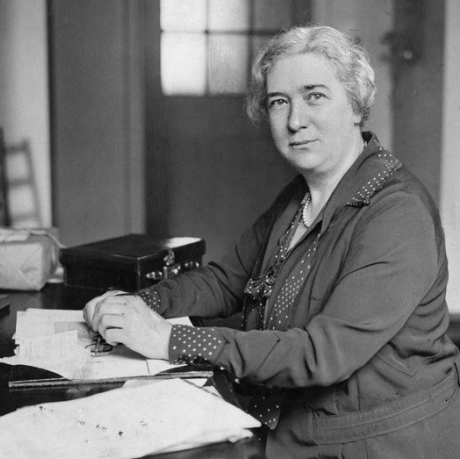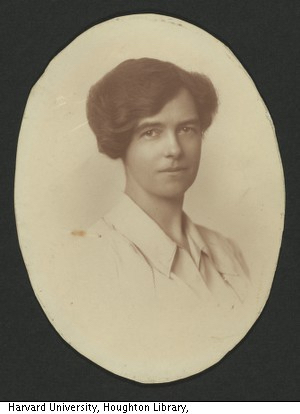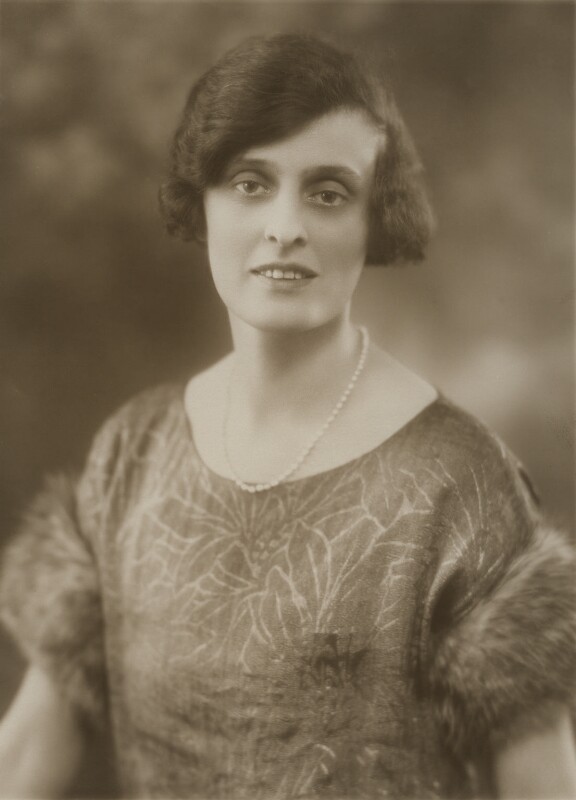
‘Rebecca West’ was the pseudonym of Cicily Isabel Andrews: novelist, literary critic, journalist, and committed feminist and socialist. A contributor to Time and Tide from its first issue, she was also one of its long-term directors. She was born in 1892, to Isabella Fairfield and her husband Charles, and was educated at Richmond High School, Helsington Towers, George Watson’s Ladies’ College, and the Academy of Dramatic Art (1910-11). Her drama training, which she finished early, accounts for her pseudonym: Rebecca West is the heroine of Rosmersholm by Henrik Ibsen.
West’s political consciousness informed her entry to writing through journalism. She became a suffragette as a teenager, and in 1911, joined the staff of The Freewoman magazine. She wrote for the weekly socialist newspaper The Clarion, and joined the Fabian Society, meeting George Bernard Shaw at its summer schools. Examples of her early journalism, including contributions to suffrage and socialist papers, are collected in The Young Rebecca, published shortly after her death in 1982. West remained committed to feminism beyond the suffrage movement’s partial victory in 1918, and during the 1920s she became a member of the Six Point Group. During the 1930s, she grew concerned about the rise of fascism and antisemitism in Britain, and during the Second World War she and her husband Henry Andrews sheltered refugees at their home in the Chilterns. Following the war, she reported on the Nuremberg Trials for the New Yorker. Her political essays are collected in The Meaning of Treason (1947) and Train of Powder (1955).
Alongside her political journalism, West was a formidable literary critic, contributing numerous book reviews to publications including the New Republic, the New Statesman, the Bookman, and the New York Herald Tribune. She was deeply critical of leading male modernist T. S. Eliot, whose approach to criticism she attacked in a 1929 lecture at London’s City Literary Institute, and in a 1932 Daily Telegraph article. Her own critical work, The Strange Necessity (1928), reviewed in Time and Tide by Sylvia Lynd, makes an important contribution to modernist criticism. West also wrote fiction. Her novels include The Return of the Soldier(1918), The Fountain Overflows (1956), a bestseller, and Sunflower, published posthumously.
West contributed to Time and Tide from its first issue, and joined its board of directors in 1922. She was the magazine’s first drama critic, writing weekly theatre reviews until August 1921, and, less regularly, contributed signed articles and essays on a variety of political and cultural subjects throughout the interwar years. Her name had considerable prestige amongst the intellectual review reading public – in one piece of private correspondence, Lady Rhondda told West that a recent article ‘ought to sell the paper from Land’s End to John O’Groats.’ The magazine’s literary turn, following its size and price increase in 1928, was consistent with West’s belief in art’s social and political relevance, and the strapline of an advert Time and Tide placed in the Nation and Athenaeum in the same year, ‘A WEEKLY REVIEW IS NOT A LUXURY – It is a necessity’ echoed West’s assertion, in The Strange Necessity, that ‘Art is not a luxury, but a necessity’. In December 1928, a monthly series ‘Notes on Books and Writers by Rebecca West’ positioned West as a significant literary critic, and she used the series to discuss figures with highbrow appeal, including Russian novelist Leo Tolstoy, and Wyndham Lewis, the avant garde writer, painter, and critic, and another Time and Tide contributor.
West was good friends with Lady Rhondda, and during the 1920s, stayed at Stonepitts, the weekend house in Kent that Rhondda owned with Helen Archdale. Along with Rhondda, West was included by Hitler on a blacklist of journalists to be arrested after his planned invasion of Britain. West remained a Time and Tidecontributor and director after the Second World War. She was awarded her CBE in 1949, her DBE in 1959, and continued writing until she died, in 1983.
By Dr Eleanor Reed
Sources
https://www.oxforddnb.com/view/10.1093/ref:odnb/9780198614128.001.0001/odnb-9780198614128-e-3181
Clay, Catherine. Time and Tide: The Feminist and Cultural Politics of a Modern Magazine. Edinburgh University Press, Ltd, 2019 (2018)
John, Angela V. Turning the Tide: The Life of Lady Rhondda. Parthian, 2013
Orel, Harold. The Literary Achievement of Rebecca West. Palgrave Macmillan, 1986


